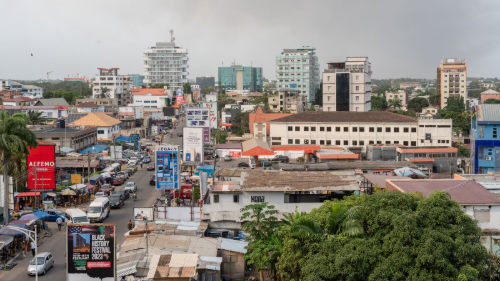Fitch Lifts Ghana’s Credit Rating on Eurobond Deal, Cooling Inflation

TLDR
- Fitch Ratings has upgraded Ghana’s Long-Term Foreign-Currency Issuer Default Rating (IDR) from ‘Restricted Default’ to ‘B-’ with a Stable Outlook
- The upgrade follows the successful restructuring of $13.1 billion in Eurobond debt and progress on remaining external debt talks
- The credit rating agency cited improving macroeconomic conditions, including a drop in inflation from 23% in 2024 to 18.4% in May 2025—its lowest level in over three years
Fitch Ratings has upgraded Ghana’s Long-Term Foreign-Currency Issuer Default Rating (IDR) from ‘Restricted Default’ to ‘B-’ with a Stable Outlook. The upgrade follows the successful restructuring of $13.1 billion in Eurobond debt and progress on remaining external debt talks. Fitch expects the full restructuring process to conclude by end-2025.
The credit rating agency cited improving macroeconomic conditions, including a drop in inflation from 23% in 2024 to 18.4% in May 2025—its lowest level in over three years. Inflation is forecast to average 15% this year and fall to 10% in 2026. The Ghanaian cedi has also strengthened, reversing years of depreciation.
Fitch noted increased investor confidence, tighter fiscal discipline, and exchange rate stability. The Finance Ministry projects a primary fiscal surplus of 0.5% of GDP in 2025 and a decline in the debt-to-GDP ratio to 60%, down from 93% in 2022. Gross reserves reached $6.8 billion, and interest payments now consume 25% of revenue, down from 48% in 2021.
Officials say the upgrade signals a return to global financial credibility. The government expects the move to support access to capital markets and attract foreign investment.
Daba is Africa's leading investment platform for private and public markets. Download here
Key Takeaways
Ghana’s upgrade from default to B- represents more than just a rating shift—it’s a signal of macroeconomic stabilisation and policy credibility returning after two years of crisis. Since defaulting on its external debt in 2022, Ghana has implemented a fiscal consolidation strategy under Finance Minister Dr. Cassiel Ato Forson, combining debt restructuring, inflation control, and exchange rate management. The turnaround has begun to show results. Inflation is declining, the cedi is gaining strength, and interest costs on public debt are falling. These shifts are critical, especially in a country where inflationary pressures have historically impacted food prices and eroded purchasing power. Ghana’s public debt burden remains high, but falling debt ratios and rising reserves provide more fiscal space. With debt service taking a smaller share of revenue and a projected primary surplus, fiscal policy is slowly regaining sustainability.

Next Frontier
Stay up to date on major news and events in African markets. Delivered weekly.
Pulse54
UDeep-dives into what’s old and new in Africa’s investment landscape. Delivered twice monthly.
Events
Sign up to stay informed about our regular webinars, product launches, and exhibitions.




